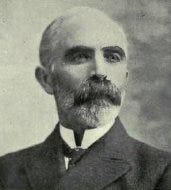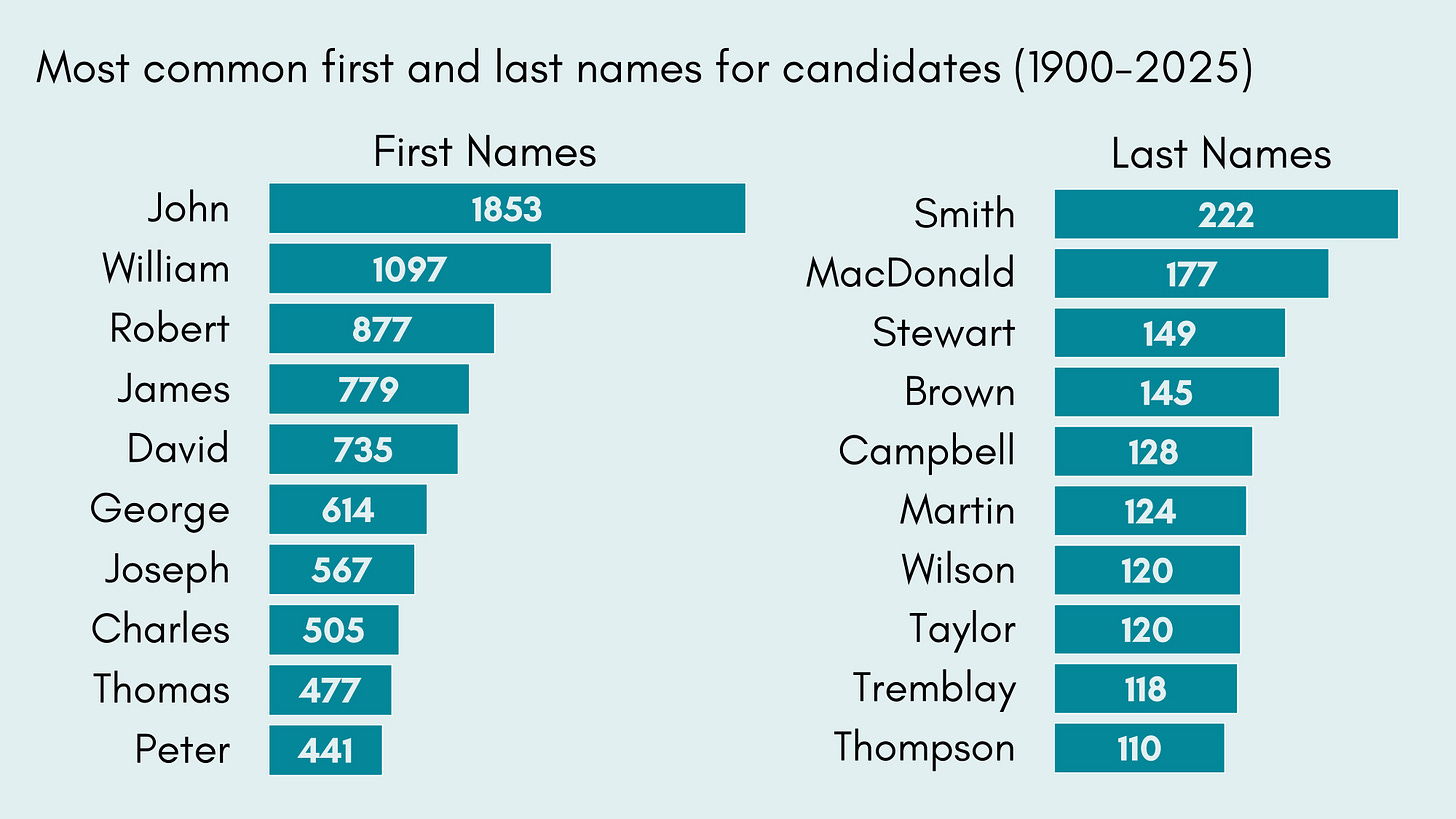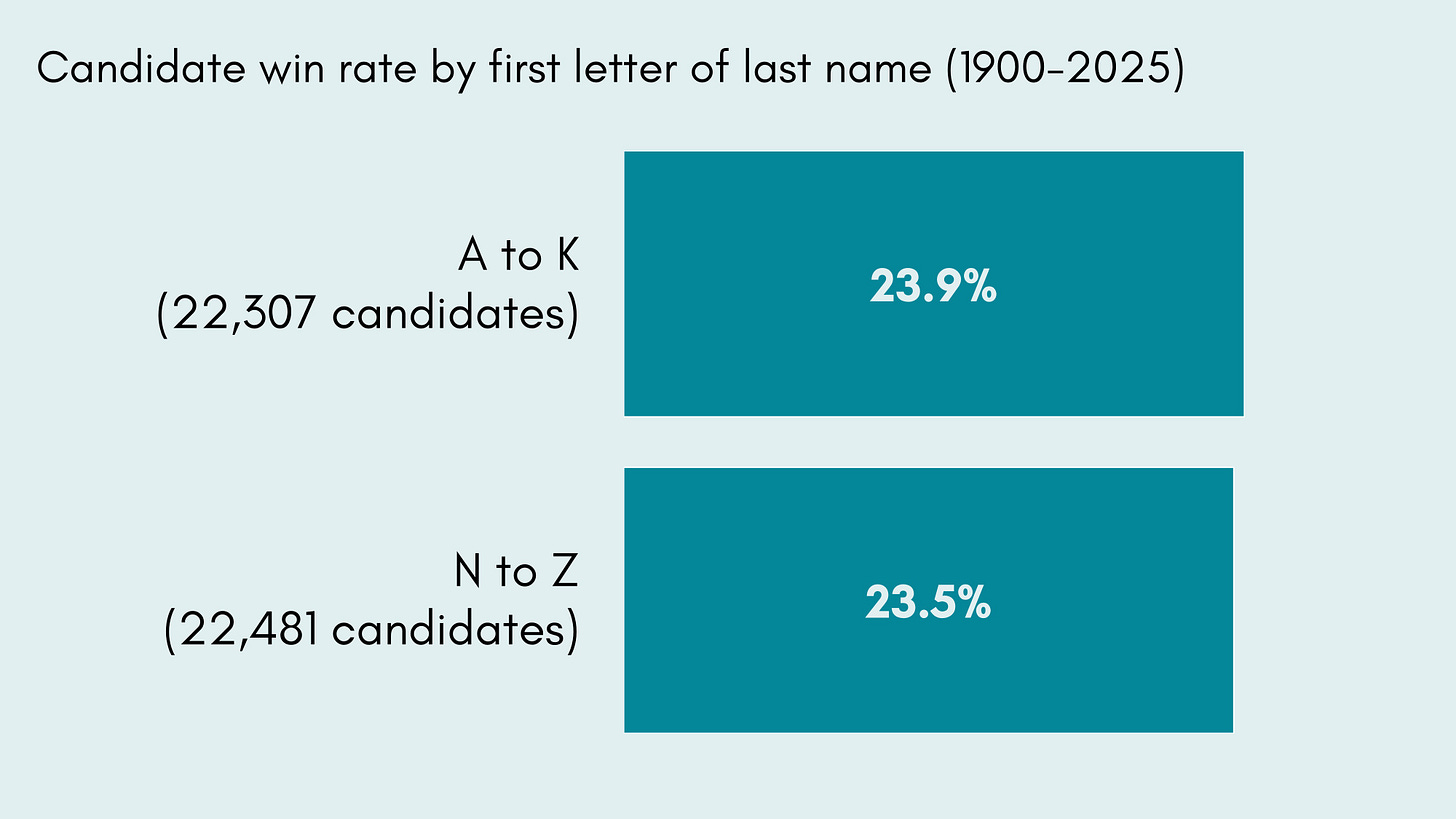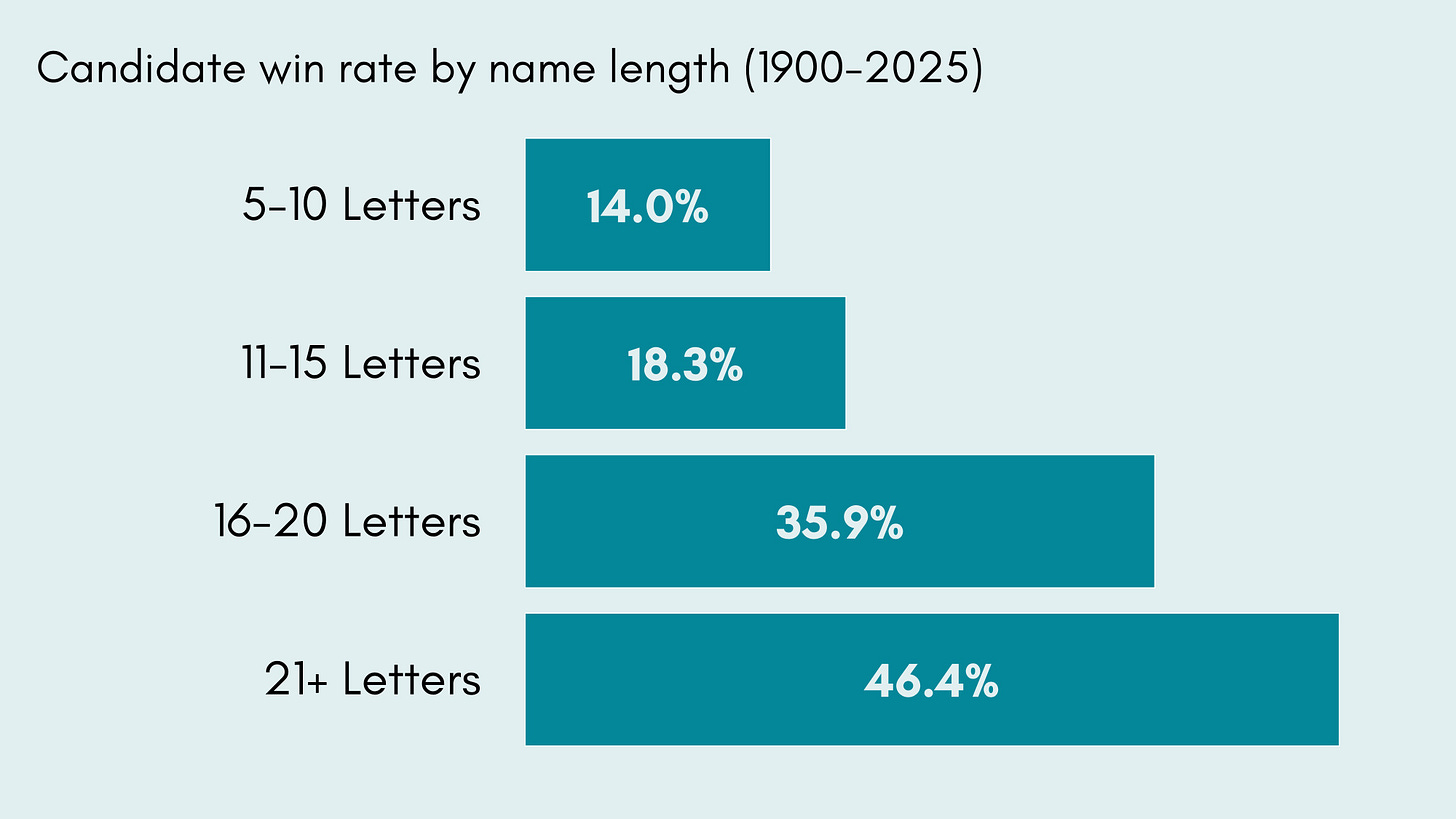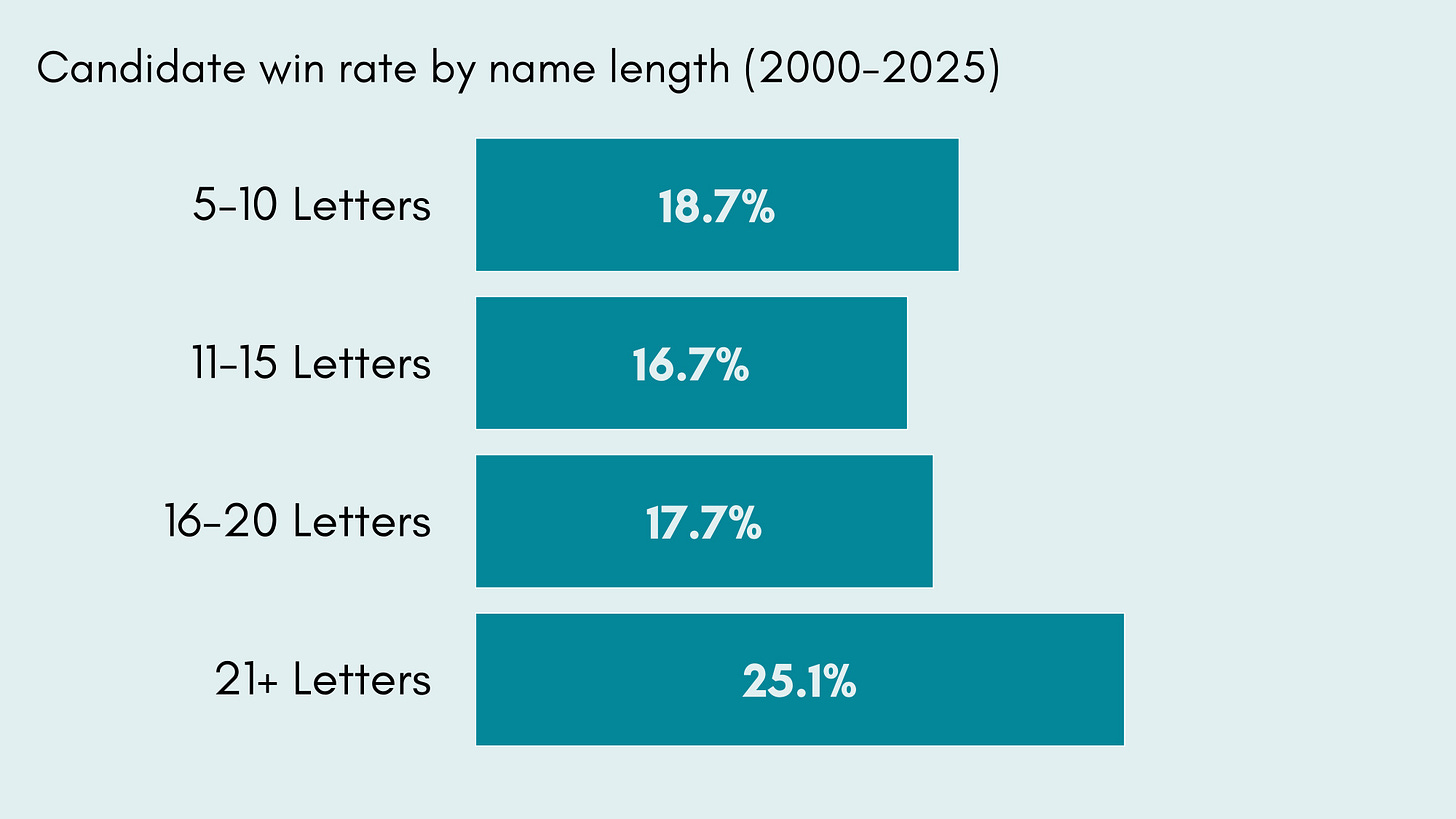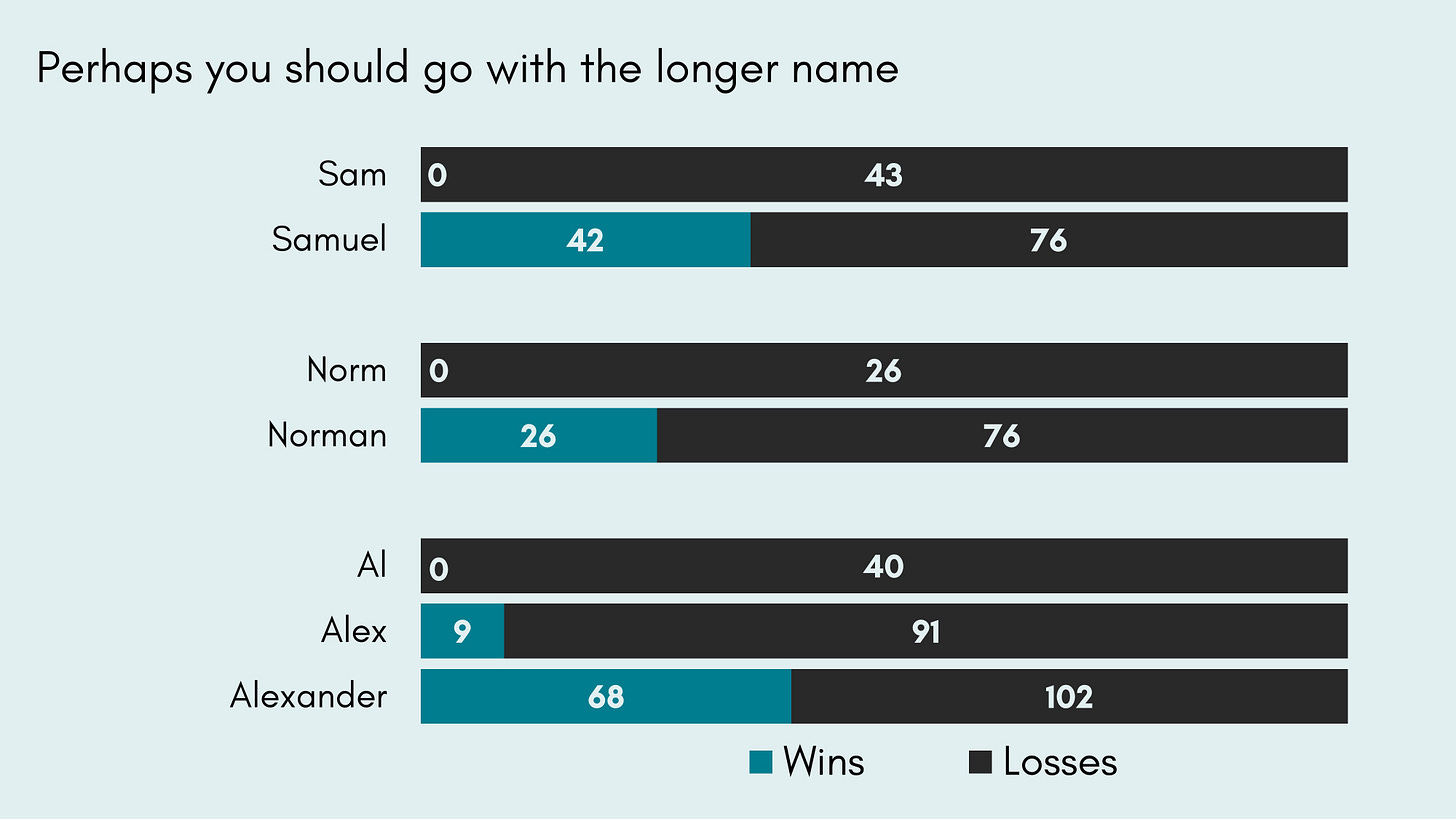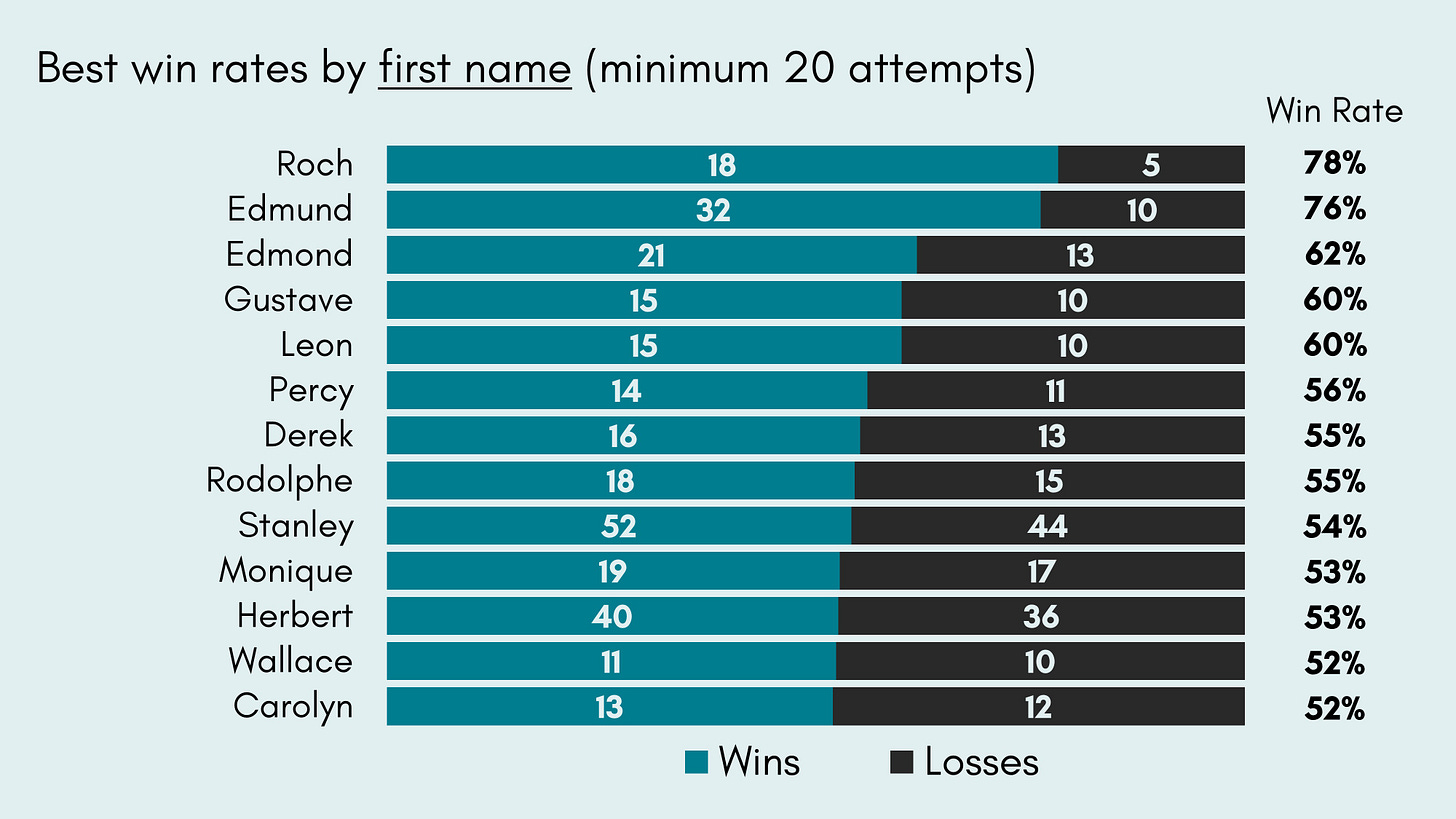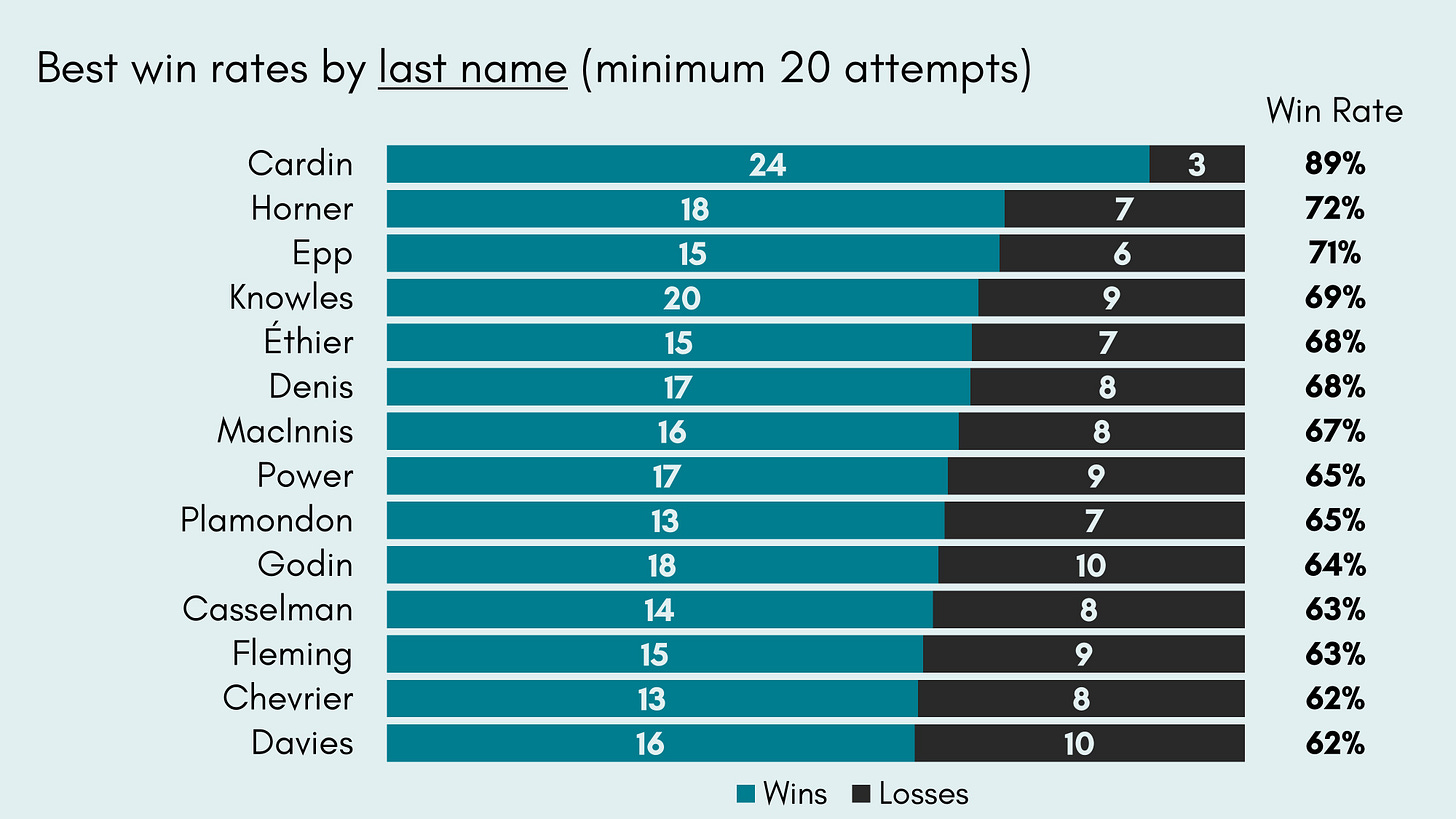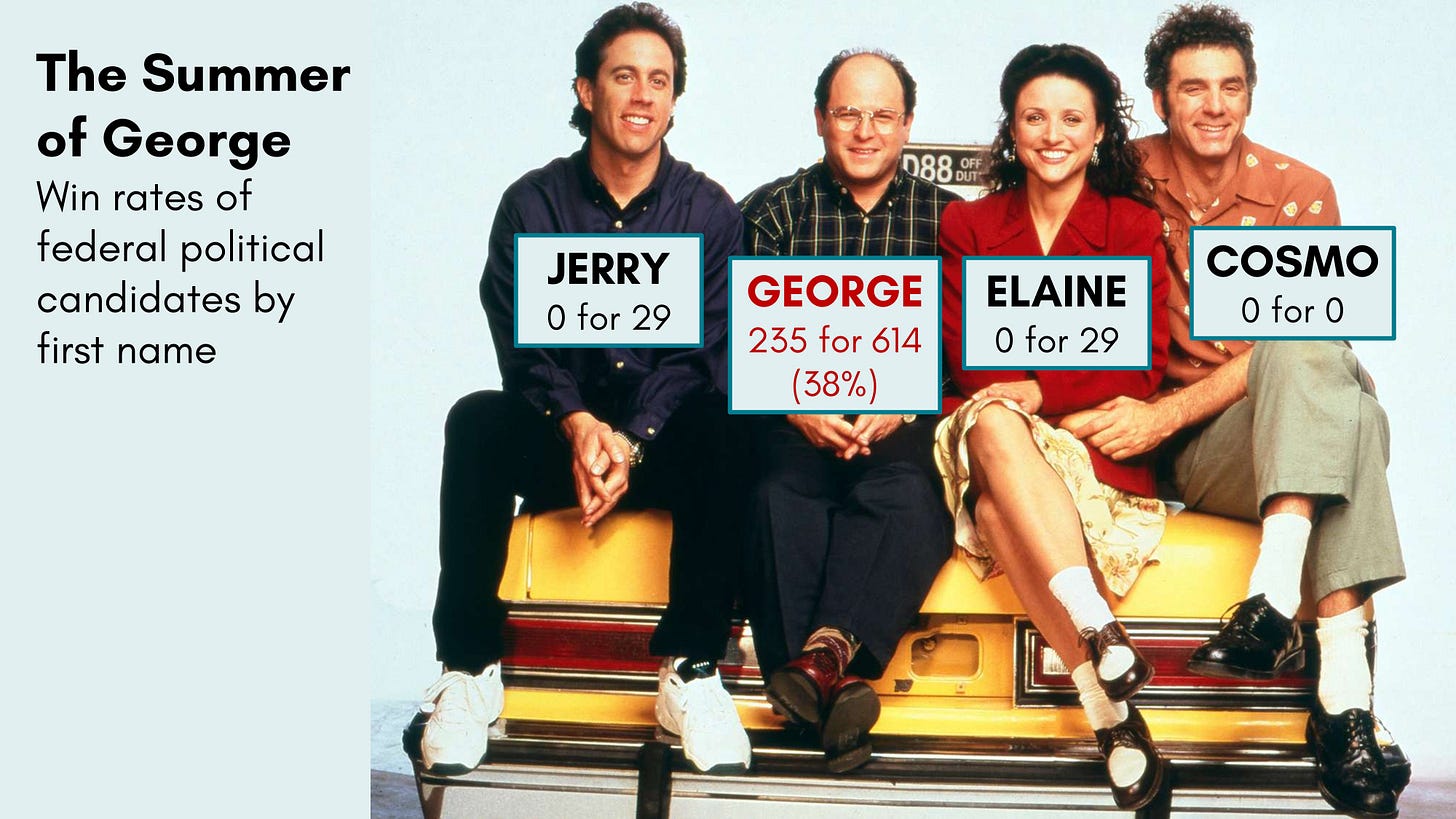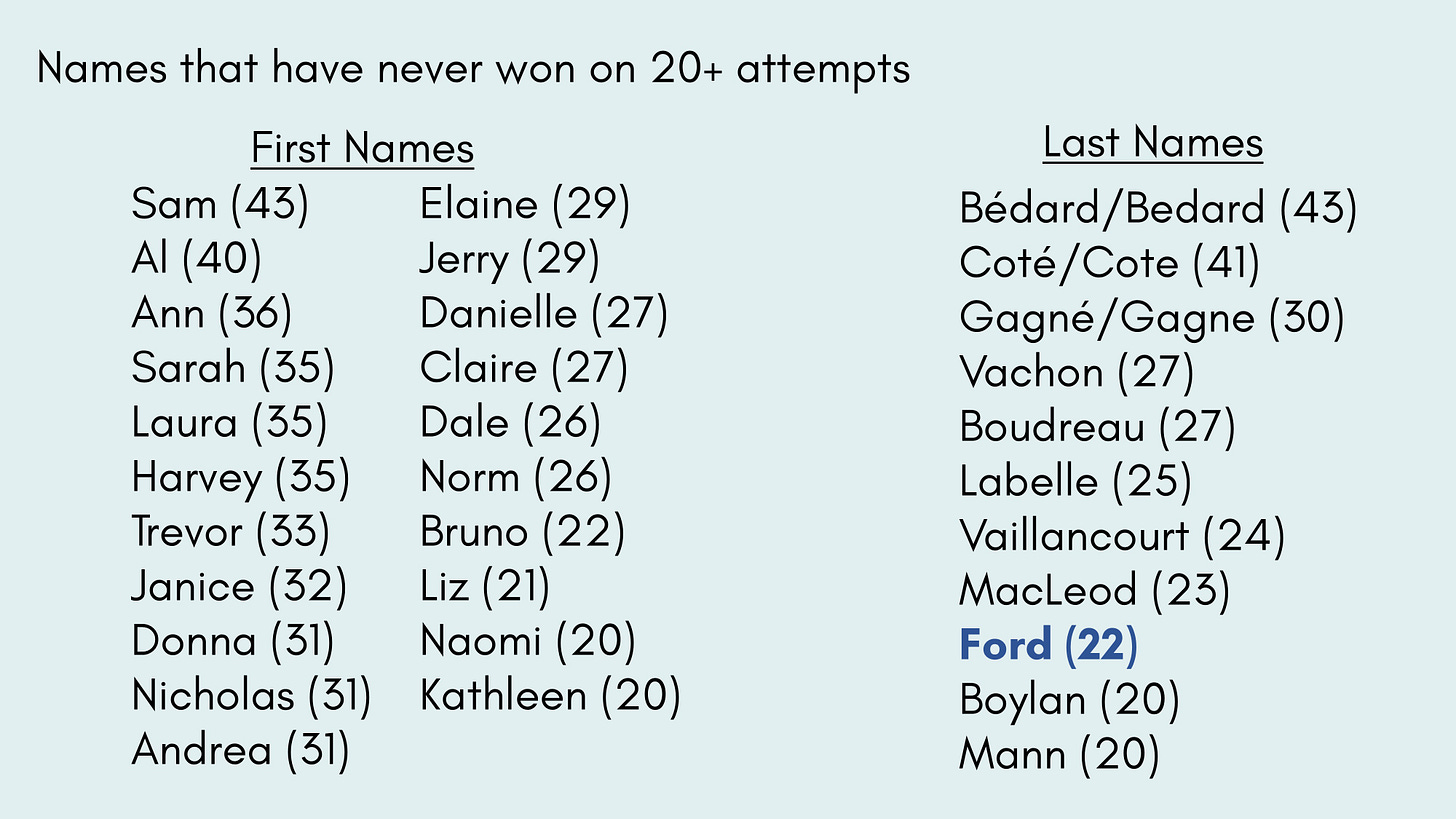John MacDonald, Charles McCool and Thea Bove Zznoneoff: A statistical history of candidate names
Plus, investigating if alphabetical order and name length make a difference in candidate win rates - one of them does!
This post is part of my summer series on the history of federal election candidates in Canada. You can see my analysis on gender and ballot length here and my analysis of candidate occupations here.
Today we’re talking about names.
48,717 names have been listed on federal ballots in Canadian history, but I’ll be narrowing down my dataset to the 44,821 from 1900 to 2025 for this post as there are some inconsistencies with the pre-1900 data (notably many candidates listed initials instead of first names on ballots pre-1900).
With that many candidates, there are bound to be some cool names, although perhaps none as cool as Charles McCool. McCool was a lumber merchant before becoming a political candidate, so if you’ve read my post on occupations, you know he won.1 McCool served 2 terms from 1900-1908 sporting one of the better mustaches in an era of great MP mustaches.
Charles McCool’s grandson went by Charles Frank McGee and would later be one of the shortest serving Cabinet Ministers in Canadian history as a Minister without Portfolio for less than a month. McGee also set an unfortunate record as the only federal candidate to ever receive more than 50,000 votes in a losing campaign.
Those two Charles’ were responsible for 5 of the 217 election wins by candidates named “Charles” since 1900, but this post isn’t solely about men named Charles.
What else can be learned from the history of federal candidate names?
John A. MacDonald Set the Template for Successful Names in Canadian Politics
It might be cliché, but the most common first and last names for political candidates are literally “John” and “Smith”.
This raises the question of whether there have been actual candidates with both of the most common names, and I’m pleased to say there has. “John Smith” has appeared on a federal ballot 13 times since 1900, winning on six of those occasions.
“John” is also the most successful first name with 585 wins (32% win rate), but only 23% of Smiths have won, allowing “MacDonald” (58 wins, 33%) to surpass it as the most frequently successful last name since 1900. It turns out that sharing a name with the first Prime Minister of Canada is a pretty decent indicator that you could end up as a Member of Parliament yourself.
Don’t Bother Changing Your Last Name to Aalborg
When I talked to some friends and family in the process of writing this post, the most common request I received was to look into whether it matters to be listed at the top of a ballot.
Since ballot order is determined in Canada alphabetically by last name, there could be an advantage to candidates with last names that appear earlier in the alphabet if voters are more likely to pick names appearing at the top of their ballot.
However, the stats suggest this isn’t a real concern. Candidates listed in the first half of the alphabet are not significantly more likely to win elections than those lower on the ballot.
The reality is the ballot lengths in Canada are too short (approximately 4 names on an average ballot) for voters to give up on reading the list of candidates. I wouldn’t be surprised if there is an ideal ballot placement in rare scenarios where there are 50+ candidates listed, but that’s a very fringe case.
This might come as a relief to Thea Bove Zznoneoff,2 who ran in Prince George in 1997. By legally changing their name to start with 2 Zs, they ensured they were not only a none of the above option at the bottom of the ballot in their riding, but also last alphabetically on the list of all federal candidates in Canadian history.
For those interested, the most successful first letter of a last name is “M”, which has a win rate of 27.6% in federal elections.
Consider Changing Your Name to Alexander Augustus Williamson Carscallen
Alexander Augustus Williamson Carscallen is the longest name to appear on a ballot since 1900 (37 letters), winning three times as a Conservative at the turn of the century before retiring undefeated.
He happens to be the best example of a strange phenomenon in Canadian politics: longer names on ballots have been much, much more successful in federal elections.
Before we get too excited and create a different type of longest ballot, this was largely a phenomenon from the early 20th century. Very long names continue to be slightly more successful in the modern era, but the gap has shrunk.
There are many possible reasons for this phenomenon in early Canadian politics, but one of them is class-based. There’s a long history of upper class children receiving longer names in Western countries, and the early MPs in Canadian history were definitely disproportionately drawn from the aristocratic upper classes.
Canadians Don’t Support AI in Elections
However, the historical advantage of long names is not limited to upper class candidates having more and longer family names. Even if you look at just the first name appearing on the ballot, there has been a strong historical advantage to longer first names (which has disappeared in modern elections).
My best theory on this is related to perceptions of professionalism. Someone running a serious campaign for office in the early 20th century was probably going to use their full first name on the ballot.
A candidate legally named “Alexander” could realistically choose to submit “Al” or “Alex” as their name on the ballot, but historical norms around professionalism would indicate that “Alexander” is the more appropriate version to use in a formal setting. A campaign with a strong chance of winning might be concerned about this, while a longshot campaign might not care.
That results in a lot of unintuitive differences in electoral success between the short and long form versions of the same name on election ballots:
Consider Changing Your Name to Pierre “The Roch” Poilievre
On the list of most successful first names for political candidates with a minimum of 20 appearances on a ballot3, “Roch” rolls over the competition, pursued by both spellings of the name “Edmund”.
Rochs started off an absurdly dominant 16-2 in elections, but have gone 2-3 since 1980, opening the door for another first name to catch up, although most of the top names have only appeared infrequently in the past 50 years.
With ballots much longer in modern elections and win rates lower, the best way for names to stay at the top of the list is not to play.
On the last name side, “Cardin” runs away with the title thanks in large part to a 19-0 combined record by former Cabinet Ministers Arthur and Lucien Cardin
Honourable mentions are due to the first name “Thomas” (47% on 477 attempts) and the last name “Martin” (39% on 124 attempts) as the most successful names that have appeared on more than 100 ballots.
If you’re curious about a specific first or last name, I’m attaching a spreadsheet with the full list of first and last names that have appeared on ballots at the end of this post for paid subscribers.
A Section About Nothing
Finally, we have to talk about the names that haven’t graced the House of Commons, at least so far. I still have high hopes for three-quarters of the main cast of Seinfeld:
It’s silly to say there’s one name that’s the least electable, although there’s one that’s almost inarguably had the worst results. Candidates named “Ysack” have only received a total of 11 votes, which sounds pretty bad at first, but a lot worse when you realize Ysack Dupont has run in five separate elections.
This is only possible via the Longest Ballot Committee. Thanks to that movement, Dupont become the only candidate in the history of Canadian elections to receive 0 votes in consecutive contested campaigns earlier this year. He will likely receive the same number of votes in the Battle-River Crowfoot election coming up (he’s not a candidate this time).
A full list of the names that have appeared on at least 20 ballots but have never won are below. I'll note that I’m certainly not trying to discourage anyone with these names from running for office - if anything it’s the opposite! If a Sam Bedard ever runs for office, I’m going to be very invested.
I don’t think any of these names are cursed, and many of them have been represented in provincial or municipal legislatures. Two of them might not be on the list if Danielle Coté hadn’t narrowly lost in Shefford in 1988 with 43% of the vote.
It’s most likely just happenstance that most of these have not been elected and I’ll have my bingo card ready in the next election waiting to see if there’s any names I can cross off the list (much like I cheer for Scorigami).
This doesn’t mean I have to cheer for Doug Ford if he makes the jump to federal politics though, I have to draw the line somewhere.
Check to See How Your Name Has Performed in Federal Elections!
The link to the spreadsheet of the full dataset is below for paid subscribers:


